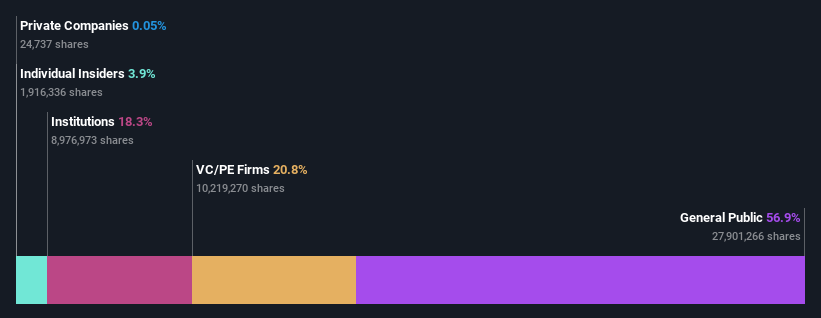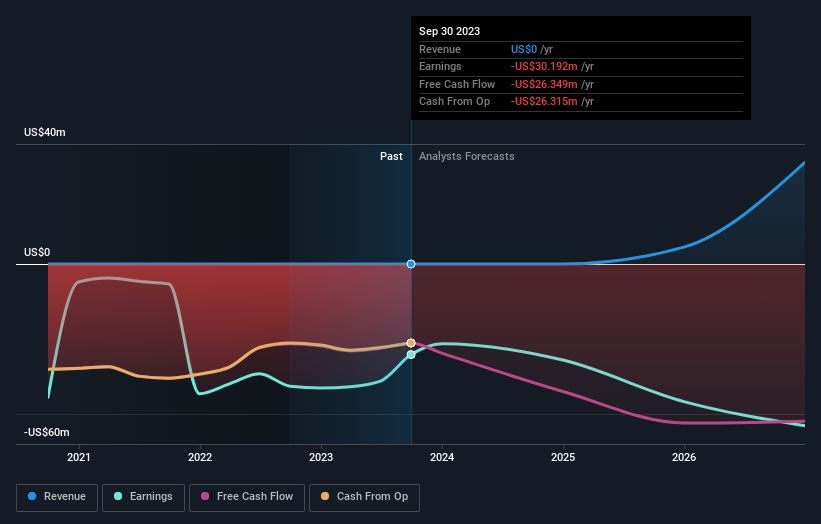Individual investors in Corvus Pharmaceuticals, Inc. (NASDAQ:CRVS) are its biggest bettors, and their bets paid off as stock gained 20% last week
Key Insights
Corvus Pharmaceuticals' significant individual investors ownership suggests that the key decisions are influenced by shareholders from the larger public
The top 25 shareholders own 42% of the company
To get a sense of who is truly in control of Corvus Pharmaceuticals, Inc. (NASDAQ:CRVS), it is important to understand the ownership structure of the business. With 57% stake, individual investors possess the maximum shares in the company. In other words, the group stands to gain the most (or lose the most) from their investment into the company.
Clearly, individual investors benefitted the most after the company's market cap rose by US$17m last week.
In the chart below, we zoom in on the different ownership groups of Corvus Pharmaceuticals.
Check out our latest analysis for Corvus Pharmaceuticals
What Does The Institutional Ownership Tell Us About Corvus Pharmaceuticals?
Institutional investors commonly compare their own returns to the returns of a commonly followed index. So they generally do consider buying larger companies that are included in the relevant benchmark index.
As you can see, institutional investors have a fair amount of stake in Corvus Pharmaceuticals. This can indicate that the company has a certain degree of credibility in the investment community. However, it is best to be wary of relying on the supposed validation that comes with institutional investors. They too, get it wrong sometimes. It is not uncommon to see a big share price drop if two large institutional investors try to sell out of a stock at the same time. So it is worth checking the past earnings trajectory of Corvus Pharmaceuticals, (below). Of course, keep in mind that there are other factors to consider, too.
We note that hedge funds don't have a meaningful investment in Corvus Pharmaceuticals. OrbiMed Advisors LLC is currently the largest shareholder, with 14% of shares outstanding. Meanwhile, the second and third largest shareholders, hold 6.7% and 4.9%, of the shares outstanding, respectively. Additionally, the company's CEO Richard Miller directly holds 3.0% of the total shares outstanding.
A deeper look at our ownership data shows that the top 25 shareholders collectively hold less than half of the register, suggesting a large group of small holders where no single shareholder has a majority.
While it makes sense to study institutional ownership data for a company, it also makes sense to study analyst sentiments to know which way the wind is blowing. There are plenty of analysts covering the stock, so it might be worth seeing what they are forecasting, too.
Insider Ownership Of Corvus Pharmaceuticals
The definition of company insiders can be subjective and does vary between jurisdictions. Our data reflects individual insiders, capturing board members at the very least. The company management answer to the board and the latter should represent the interests of shareholders. Notably, sometimes top-level managers are on the board themselves.
I generally consider insider ownership to be a good thing. However, on some occasions it makes it more difficult for other shareholders to hold the board accountable for decisions.
Our most recent data indicates that insiders own some shares in Corvus Pharmaceuticals, Inc.. In their own names, insiders own US$4.0m worth of stock in the US$103m company. This shows at least some alignment, but we usually like to see larger insider holdings. You can click here to see if those insiders have been buying or selling.
General Public Ownership
The general public -- including retail investors -- own 57% of Corvus Pharmaceuticals. This level of ownership gives investors from the wider public some power to sway key policy decisions such as board composition, executive compensation, and the dividend payout ratio.
Private Equity Ownership
With an ownership of 21%, private equity firms are in a position to play a role in shaping corporate strategy with a focus on value creation. Sometimes we see private equity stick around for the long term, but generally speaking they have a shorter investment horizon and -- as the name suggests -- don't invest in public companies much. After some time they may look to sell and redeploy capital elsewhere.
Next Steps:
While it is well worth considering the different groups that own a company, there are other factors that are even more important. Take risks for example - Corvus Pharmaceuticals has 5 warning signs (and 2 which shouldn't be ignored) we think you should know about.
Ultimately the future is most important. You can access this free report on analyst forecasts for the company.
NB: Figures in this article are calculated using data from the last twelve months, which refer to the 12-month period ending on the last date of the month the financial statement is dated. This may not be consistent with full year annual report figures.
Have feedback on this article? Concerned about the content? Get in touch with us directly. Alternatively, email editorial-team (at) simplywallst.com.
This article by Simply Wall St is general in nature. We provide commentary based on historical data and analyst forecasts only using an unbiased methodology and our articles are not intended to be financial advice. It does not constitute a recommendation to buy or sell any stock, and does not take account of your objectives, or your financial situation. We aim to bring you long-term focused analysis driven by fundamental data. Note that our analysis may not factor in the latest price-sensitive company announcements or qualitative material. Simply Wall St has no position in any stocks mentioned.


